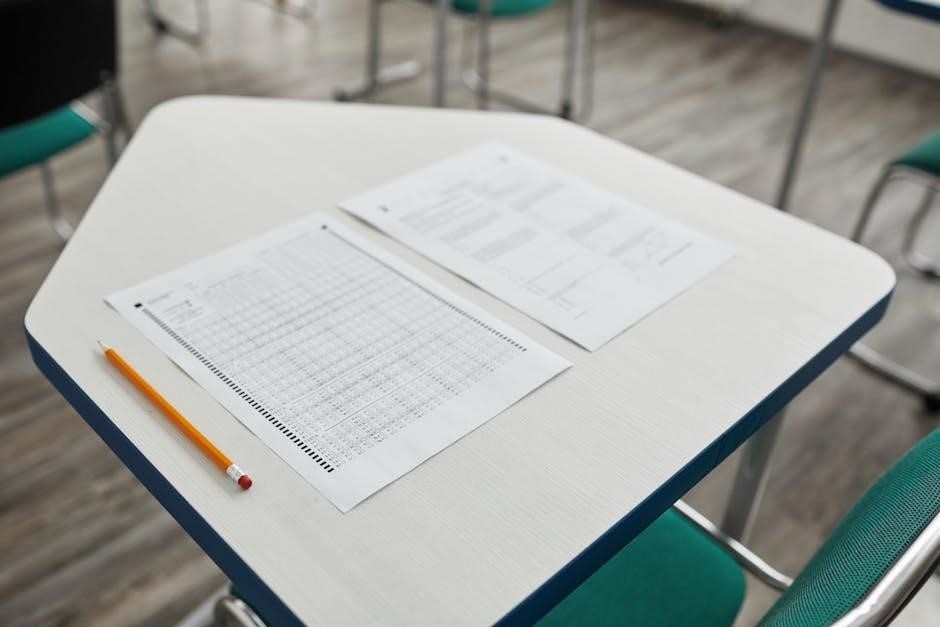The ServSafe Alcohol Exam ensures professionals understand responsible alcohol service, legal responsibilities, and intoxication signs. It’s a crucial certification for those in the hospitality industry, promoting safety and compliance.
1.1 Overview of the ServSafe Alcohol Certification
The ServSafe Alcohol Certification is a nationally recognized credential ensuring professionals understand responsible alcohol service. It covers legal aspects, recognizing intoxication, and proper service techniques. The certification is valid for three years and is essential for bartenders, servers, and managers. The exam consists of multiple-choice questions, and preparation materials, including study guides and practice exams, are widely available. Obtaining this certification demonstrates compliance with state laws and promotes a safe drinking environment.
1.2 Importance of Responsible Alcohol Service
Responsible alcohol service is critical to prevent alcohol-related harm, ensuring safety for both patrons and establishments. It reduces legal risks, such as criminal liability for serving intoxicated guests. Proper practices, like ID checking and refusing service to intoxicated individuals, protect businesses from lawsuits and foster a safer environment. This approach also promotes public health by minimizing drunk driving incidents and alcohol-related injuries. Understanding these responsibilities is a key focus of the ServSafe Alcohol Exam, emphasizing the importance of ethical and lawful service practices in the hospitality industry.

Exam Structure and Format
The ServSafe Alcohol Exam features multiple-choice questions, assessing knowledge on responsible service, legal aspects, and intoxication signs. It is available online or in-person, with a set time limit and passing score to ensure competency in alcohol service practices.
2.1 Types of Questions on the ServSafe Alcohol Exam
The ServSafe Alcohol Exam features multiple-choice questions, true/false statements, and scenario-based inquiries. These question types assess knowledge on responsible alcohol service, legal responsibilities, and recognizing intoxication signs. Multiple-choice questions test understanding of concepts like blood alcohol content and state-specific regulations. True/false questions evaluate familiarity with laws, such as serving intoxicated guests or minors. Scenario-based questions apply theoretical knowledge to real-world situations, ensuring practical understanding of responsible service practices and legal implications. This variety ensures comprehensive assessment of essential skills and knowledge required for certification.
2.2 Time Limit and Passing Score
The ServSafe Alcohol Exam has a time limit of 3 hours and consists of 40 multiple-choice questions. To pass, candidates must score at least 75%. This ensures they demonstrate a solid understanding of responsible alcohol service, legal responsibilities, and recognizing signs of intoxication. The exam is designed to assess both knowledge and practical application, ensuring servers can apply their training effectively in real-world scenarios. Meeting the passing score confirms competence in safely and legally serving alcohol.
2.3 Exam Format: Online vs. In-Person
The ServSafe Alcohol Exam is available in both online and in-person formats. The online exam offers flexibility, allowing candidates to take it at their convenience, 24/7, with a computer and internet connection. In-person exams are proctored at designated testing centers, providing a structured environment. Both formats include the same content and time limits, ensuring consistency. Online exams allow candidates to review answers before submission, while in-person exams provide immediate results. Choose the format that best suits your learning style and preferences for optimal success.
Key Topics Covered in the Exam
The exam covers legal aspects, recognizing intoxication signs, handling difficult situations, and the effects of alcohol on the body, ensuring comprehensive knowledge for responsible alcohol service.

3.1 Legal Aspects of Alcohol Service

The exam covers criminal liability for serving intoxicated guests, Dram Shop laws, and state-specific regulations. It emphasizes understanding legal responsibilities, such as ID verification and refusal of service to minors or intoxicated individuals. Knowledge of alcohol-related laws, including prohibited practices and consequences like fines or license suspension, is essential. The legal aspects ensure servers understand their role in preventing alcohol-related harm and complying with local and federal regulations to avoid legal repercussions.
3.2 Recognizing Intoxication Signs
Recognizing signs of intoxication is critical for responsible alcohol service. Common indicators include slurred speech, drowsiness, swaying, and difficulty concentrating; Behavioral changes, such as rude comments or aggressive behavior, may also signal intoxication. Physical signs like glassy eyes or unsteady movements are key red flags. Servers must monitor these cues to prevent over-serving and ensure guest safety. Understanding these signs helps in making informed decisions to refuse service, reducing risks of alcohol-related incidents and legal consequences. Proper identification of intoxication is a cornerstone of responsible alcohol service practices.
3.3 Handling Difficult Situations
Handling difficult situations, such as refusing service to intoxicated guests, requires calm and professional communication. Servers should remain empathetic, avoid confrontation, and clearly explain their reasoning. Using phrases like “I’m concerned about your safety” can help de-escalate tensions. It’s important to know when to involve management or security. Proper training in conflict resolution and establishment policies ensures effective handling of such scenarios, minimizing risks of escalation and legal consequences. Effective communication and adherence to protocols are key to maintaining a safe and respectful environment.

Legal Responsibilities and Liabilities
Serving alcohol carries legal risks, including criminal liability for serving intoxicated guests. Dram Shop laws hold establishments accountable for harm caused by intoxicated patrons they served.
4.1 Criminal Liability for Serving Intoxicated Guests
Serving alcohol to intoxicated guests can result in criminal charges, as servers may be held liable for harm caused by intoxicated patrons. This liability applies even if the guest’s intoxication is apparent but not legally confirmed. Criminal charges can arise from direct service or allowing continued alcohol consumption by visibly intoxicated individuals. Such legal consequences emphasize the importance of responsible service practices to prevent alcohol-related incidents and protect both establishments and staff from potential legal repercussions.
4.2 Dram Shop Laws and Their Implications
Dram Shop Laws hold establishments and servers legally responsible for harm caused by intoxicated patrons they served. These laws vary by state but generally allow victims or their families to sue for damages. Implications include financial liability, legal consequences, and reputational damage for businesses. Dram Shop Laws emphasize the importance of adhering to responsible alcohol service practices to minimize risks and avoid legal repercussions. Understanding these laws is crucial for establishments to ensure compliance and protect against potential lawsuits stemming from alcohol-related incidents.
4.3 State-Specific Alcohol Service Regulations
State-specific alcohol service regulations vary widely, impacting how establishments operate. Some states allow minors in licensed premises with parental consent, while others enforce strict age restrictions. Certain states permit “happy hour” promotions, while others prohibit them. Legal drinking ages and ID requirements also differ. Servers must understand their state’s unique laws to avoid legal consequences. These regulations are designed to promote public safety and responsible alcohol service, ensuring compliance with local standards. Familiarity with state-specific rules is essential for professionals in the alcohol service industry to operate legally and effectively.

Effects of Alcohol on the Body
Alcohol impacts the central nervous system, impairing motor skills, judgment, and behavior. Blood Alcohol Content (BAC) measures intoxication levels, affecting coordination, reaction time, and decision-making abilities progressively.
5.1 Blood Alcohol Content (BAC) Explained
Blood Alcohol Content (BAC) measures the percentage of alcohol in the bloodstream. It is a critical factor in determining intoxication levels. A BAC of 0.08% is legally considered intoxicated in most states. Factors like body weight, metabolism, and the amount of alcohol consumed influence BAC. Understanding BAC is essential for recognizing impairment and ensuring responsible alcohol service. Higher BAC levels impair motor skills, judgment, and decision-making, increasing the risk of accidents and unsafe behavior. Monitoring BAC helps prevent over-serving and promotes a safer environment for both patrons and staff.
5.2 How Alcohol Impacts Behavior and Motor Skills
Alcohol impairs motor skills, affecting coordination, balance, and reaction time. Even low BAC levels can cause swaying, stumbling, or difficulty with tasks. Behaviorally, alcohol lowers inhibitions, leading to mood swings, poor judgment, and increased aggression. As BAC rises, slurred speech, drowsiness, and loss of control become evident. Recognizing these signs is crucial for responsible service, as impaired individuals pose risks to themselves and others. Understanding alcohol’s effects on behavior and motor skills helps servers intervene appropriately and maintain a safe environment. Early identification of intoxication signs is key to preventing harm.
5.3 Understanding Alcohol Metabolism
Alcohol metabolism begins in the stomach and liver, where enzymes break it down. The liver processes about one drink per hour, but this rate varies by individual factors like weight and metabolism. Blood Alcohol Content (BAC) rises as alcohol enters the bloodstream faster than it’s metabolized. Understanding metabolism helps explain why some people show intoxication signs sooner than others. This knowledge is crucial for recognizing when someone has had too much to drink, enabling servers to act responsibly and prevent over-service.
Responsible Alcohol Service Practices
Responsible alcohol service involves proper ID checks, monitoring for intoxication signs, and refusing service to those who appear intoxicated to ensure legal and ethical standards are met.

6.1 Proper ID Checking Procedures
Proper ID checking is crucial to ensure compliance with legal age requirements. Valid forms of ID include driver’s licenses, state IDs, and passports. Servers must verify the ID’s authenticity by checking expiration dates and security features. If an ID appears fake or expired, service should be refused. Additionally, if a guest appears underage, ID must be requested, and service denied if they cannot provide valid proof of age. This process helps prevent underage drinking and protects the establishment from legal consequences.
6.2 Refusing Service to Intoxicated Guests
Refusing service to intoxicated guests is essential to prevent legal and safety risks. Signs of intoxication include slurred speech, unsteady movements, and aggressive behavior. Servers must politely decline further alcohol service and offer non-alcoholic alternatives. It’s important to remain calm and professional to avoid escalation. Documenting the refusal can provide legal protection. Refusing service helps protect the guest, others, and the establishment from potential harm or liability. Proper training ensures staff can handle such situations confidently and effectively.
6.3 Managing Alcohol Service in Special Events
Managing alcohol service at special events requires careful planning and trained staff. Ensure all servers are certified and aware of legal responsibilities. Implement ID checks, monitor alcohol intake, and set a drink limit. Designate a cutoff time for serving alcohol to prevent over-service. Provide water and non-alcoholic options to encourage responsible consumption. Train staff to recognize intoxication signs and refuse service when necessary. Have a plan for handling intoxicated guests, including security assistance if needed. Proper management ensures a safe and enjoyable environment for all attendees while minimizing legal risks.
Exam Preparation and Study Resources

Utilize official study guides, practice exams, and online resources to prepare effectively. These materials cover key topics like legal aspects, intoxication signs, and responsible service practices, ensuring comprehensive understanding.
7.1 Recommended Study Guides and Materials
Official ServSafe Alcohol Study Guides provide comprehensive coverage of exam topics. Practice exams and online resources, such as video tutorials and interactive quizzes, enhance preparation. These materials focus on key areas like legal responsibilities, recognizing intoxication, and responsible service practices. Utilizing these resources ensures a thorough understanding of the exam content and helps identify areas for improvement. Additionally, downloadable PDF guides offer convenient access to study anywhere, making exam preparation flexible and efficient.
7.2 Benefits of Taking Practice Exams
Taking practice exams for the ServSafe Alcohol Exam offers numerous benefits. They familiarize you with the exam format, timing, and question types, reducing test-day anxiety. Practice exams help identify knowledge gaps, allowing targeted study. Many resources, like the 2023 PDF guides, include 100 verified questions, mirroring real exam conditions. Scoring practice exams reveals strengths and weaknesses, ensuring comprehensive preparation. Regular practice builds confidence and improves time management skills, crucial for success. Utilizing these tools enhances overall readiness and increases the likelihood of achieving a high score.
7.3 Utilizing Online Resources for Effective Study
Online resources are invaluable for preparing for the ServSafe Alcohol Exam. Websites offer comprehensive study guides, practice exams, and video tutorials. The 2023 PDF guides provide detailed answers and explanations, ensuring clarity on complex topics. Interactive tools, such as flashcards and quizzes, reinforce learning. Many platforms allow access to updated materials, reflecting the latest exam changes. Utilizing these resources enables efficient study, helping candidates master responsible alcohol service, legal aspects, and intoxication signs. They are accessible anytime, making them ideal for flexible learning schedules.

Tips for Exam Success

Utilize practice exams to familiarize yourself with the format. Study guides and online resources provide detailed answers, helping you master key topics like alcohol effects and legal responsibilities.
8.1 Time Management During the Exam
Effective time management is crucial for success. Skim through all questions first to identify easier ones, then allocate time evenly. Spend no more than 1-2 minutes per question.
Avoid getting stuck on difficult questions; mark them and return later. Use the remaining time to review your answers. Practice exams help build speed and accuracy. Stay calm and systematic to ensure you complete the exam within the allotted time. Proper time management reduces stress and improves performance.
8.2 Strategies for Answering Multiple-Choice Questions
Read each question carefully and identify key terms; Eliminate obviously incorrect answers first. Look for keywords like “always” or “never” that often indicate extremes.
Use the process of elimination to narrow down choices. If unsure, make an educated guess based on prior knowledge. Avoid changing answers unless certain. Practice with sample questions to improve speed and accuracy. Stay focused and systematic to maximize your score. Confidently apply what you’ve learned to select the best answer.
8.3 Staying Calm and Focused
Staying calm and focused is essential for exam success. Take deep breaths to manage nerves and maintain a positive mindset. Read each question carefully, ensuring you understand what’s being asked. Avoid rushing and allocate time evenly across all questions. Eliminate distractions by focusing solely on the task at hand. If stuck, move forward and return later. Stay hydrated and energized to maintain concentration. A clear mind and steady approach will help you perform at your best and achieve a high score.
Post-Exam Actions and Certification
After passing the exam, download your certification and understand renewal requirements. Apply your knowledge in real-world scenarios to ensure responsible alcohol service and maintain compliance with legal standards.
9.1 What to Do After Passing the Exam
After passing the ServSafe Alcohol Exam, download your certification and review renewal requirements. Print or save your certificate for employment verification. Understand state-specific renewal timelines and continuing education needs. Apply your knowledge to ensure legal compliance and responsible alcohol service in real-world scenarios. Stay updated on alcohol laws and industry best practices to maintain certification and professional competence.
9.2 Maintaining Certification Through Renewal
Maintaining ServSafe Alcohol Certification requires renewal, typically every 3 years. Check state-specific renewal timelines and complete continuing education if needed. Stay updated on alcohol laws and industry best practices. Renewal ensures ongoing competence in responsible alcohol service and legal compliance. Keep records of renewal dates and requirements to avoid certification lapse. Regular updates help professionals adapt to changing regulations and maintain a high standard of service.
9.3 Applying Certification in Real-World Scenarios
ServSafe Alcohol Certification equips professionals to handle real-world challenges, such as refusing service to intoxicated guests and ensuring legal compliance. It enables effective ID verification, recognition of intoxication signs, and management of difficult situations. Certified individuals can apply their knowledge to reduce liability risks and promote a safe environment. Practical skills gained, like responsible alcohol service practices, are invaluable in daily operations, ensuring adherence to state-specific regulations and maintaining customer safety. This certification is a cornerstone for ethical and lawful alcohol service in the hospitality industry.
